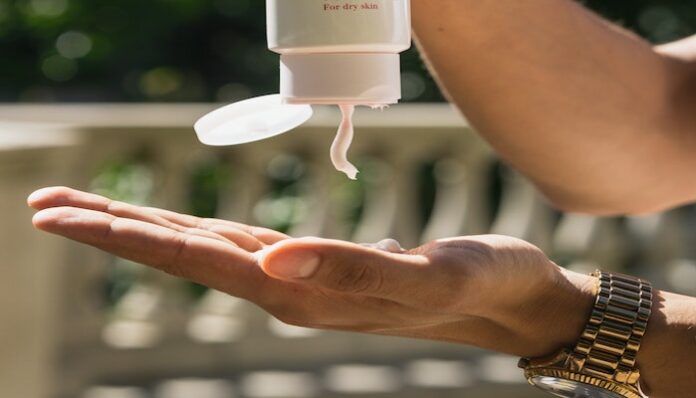
You probably already know sunscreen is an essential part of your skincare routine. So whether you’re concerned about sunburns, age spots, or wrinkles and fine lines, applying this miracle cream to your skin every day is pretty much the best thing you can do for your skin. But how exactly does it work to protect you? And how do you pick the best formula for your needs, especially with so many options available on the market?
To help you out, we’ve created the ultimate guide to sunscreen, covering everything you need to know about your SPF products. So keep reading to understand what sunscreen is, what it does for your skin, and why it should be a part of your daily skincare routine.
What’s sunscreen?
Simply put, sunscreen is a topical product that helps protect your skin against sun damage by absorbing or reflecting harmful UV rays. As a result, it decreases your risk of cancers and protects your skin from sun-related damage, including wrinkles, sagging, and age spots.
Sunscreen can contain varying SPF amounts, ranging from 5 up to 100, which blocks 99% of UVA and UVB rays. You’ll find it in many forms, including creams, lotions, sprays, and even powders.
What exactly does sunscreen do for your skin?
Sunscreen works to protect your skin from harmful UV rays, and it does this by combining organic and inorganic active ingredients. In stores, you’ll typically find two main types of sunscreen available: physical and chemical.
Physical sunscreen, also known as mineral sunscreen, contains inorganic ingredients that reflect, scatter, and block the sunrays before they can penetrate your skin. These active ingredients are designed to sit on top of your skin rather than be absorbed and likely contain Titanium Oxide or Zinc Oxide. This type of sunscreen is also less likely to irritate your skin, doesn’t clog your pores, and reflects heat, making it a perfect choice for anyone that struggles with rosacea or uneven skin tone.
On the other hand, chemical sunscreens contain active organic ingredients that
absorb UV radiation upon contact. When these compounds are exposed to the sun, a special chemical reaction occurs. This turns potentially harmful UV rays into heat that’s released from the skin. While physical sunscreens typically block both UVA and UVB rays, chemical sunscreens often only protect your skin against one of them. Chemical sunscreens are a good choice for anyone who likes a thinner sunscreen that doesn’t leave much residue.
Why is wearing sunscreen important?
Exposure to UVA and UVB rays increases your risk of skin cancer and ages your skin upon prolonged contact. So, wearing sunscreen is a great way to lower your risk of skin cancer and prevent the photoaging of your skin.
UV rays can give your skin a thick, leathery look and promote discoloration. It also breaks down collagen, leading to wrinkles, sagging, and fine lines. Sunscreen can help prevent discoloration and dark spots from formulating, helping you maintain a smoother and more even complexion.
So it’s worth adding to your medical-grade skincare routine — it’s quick and easy to apply, with fantastic benefits, too!
What are some of the best sunscreens?
Finding the perfect sunscreen can be difficult, especially if you want it to be effective, fragrance-free, and not too expensive. It also has to work in tandem with your skincare routine and go with your skin tone or be invisible altogether. With all these requirements, simply throwing on an urban hat and your favorite pair of designer shades can be easy. But you owe yourself to stay protected, starting with a high-quality sunscreen.
1. Hydrating sunscreens
If you have dry skin or are just trying to beat the winter blues, it’s vital to look for a sunscreen with moisturizing benefits. So look for items with hyaluronic acid or vitamin B5 — two ingredients that are great for boosting your skin’s hydration levels. If you prefer natural ingredients, look for creams or lotions with ginger root extract and saccharide isomerate. These will keep your skin healthy and hydrated while also working hard to undo some of the existing sun damage.
2. Tinted sunscreens
If you want to avoid a complicated morning routine, consider looking for tinted sunscreens. These formulas offer a variety of tones to match your unique skin tone and come in many forms, including liquids, creams, and powders. So you’ll find dewy, matte, and satin options in the aisles of your favorite beauty store.
3. Hypoallergenic sunscreens
Sunscreens are notorious for clogging pores and causing breakouts. Luckily, more and more brands are creating high-quality products that don’t irritate sensitive skin. Look for mineral or physical sunscreens formulated with zinc or titanium oxide. Plus, try choosing a fragrance-free option.
About the author: Tess DiNapoli is an artist, freelance writer, and content strategist. She has a passion for yoga and often writes about health and wellness. She also enjoys covering the fashion industry and the world of fitness.
Photo by Collins Lesulie on Unsplash

















